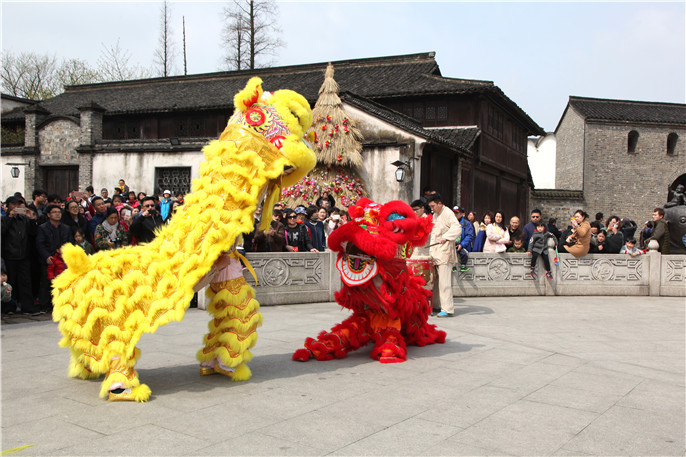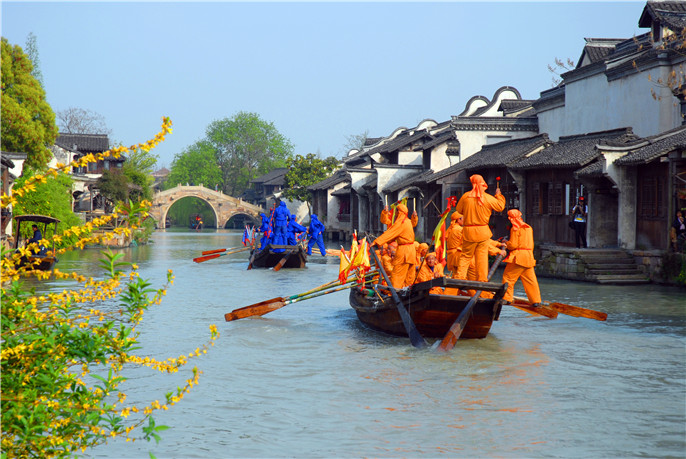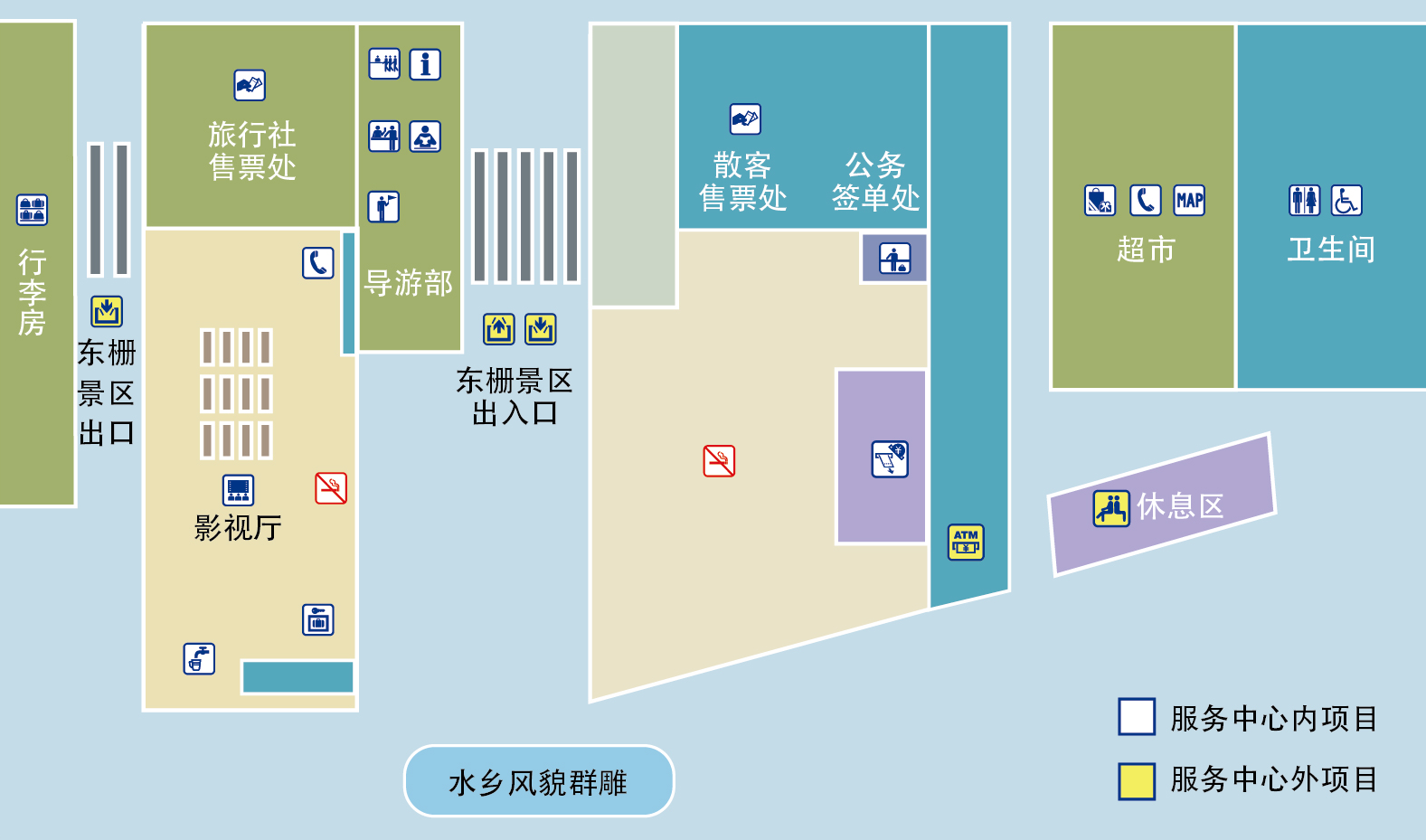


Incense fair, a folk custom, has been circulating in Wuzhen for a long time. Mr. Mao Dun called it "the carnival in rural China". At that time, Incense Fair in Wuzhen was very famous in Hang-Jjia-Hu area, and its scale was is second only to West Lake Incense Fair in Hangzhou. Wuqing Town Annals stated: "After the Qingming Festival, men and women went to Pujing Temple to burn incense, now known as Incense Fair. At that time, there were foreign film stalls, sugar stalls, circus, children's play and puppet shows, and many tourists ..."
When the incense fair began is no accurate record in history. During the Qianlong period, there was a custom of praying for silkworms in Qingwu Town Annals. "The two days before Qingming Festival were cold food, willows were inserted in front of the eaves, ... the night silkworm breeders set up a sacrifice to the white tiger ... The next day was the second tomorrow, and the men and women villagers competed to pray for silkworms in Pujing Temple and collect silkworms in Grain Rain, so be it." This is probably the embryonic form of the incense fair, and the formal name of Incense Fair can be found in Qingwu Town Annals of the Republic of China.
Incense fair started in Qingming Festival for about half a month. Two days ago in Qingming Festival, there was a temple fair called "Wearing silkworm flowers" in Hanshan, 20 kilometers from southwest of Wuzhen. Those who came from Hanshan arrived in Wuzhen, so the Incense fair in Wuzhen began.
At that time, the open areas around General Wu Temple (namely, Land Temple), Xiuzhen Temple and Pujing Temple were covered with temporary tea sheds, food stalls, sugar stalls and grocery stalls. Troupe groups from all over the country have also built their shelves, with everything such as circus, children's play and puppet shows, and Wushu and acrobatics have also come to join in the fun; The stage in front of the Xiuzhen Temple put on god plays, and the first play must be Wind Wave Pavilion, which is said to commemorate faithful and upright Yue Fei; The square is lively, and the temple is even more lively. The hall is full of bells and drums, chanting and cigarettes.

The main body who came to the incense fair is farmers. During the spring outing, they don't forget to sell their own bamboo, silkworm and agricultural and sideline products. Women, on the other hand, have a main task, that is, to "wash their silkworm hands" in Shangzhitan in front of General Wu Temple, so as to raise silkworms without disease or disaster in the future, and "the silkworms will get double harvests". Silkworm rearing is the main industry of local farmers, and the quality of silkworm directly affects the life of a year, so silkworm farmers dare not be careless, and many customs are also held around praying for silkworm.
It is reasonable to choose Qingming to incense fair in Grain Rain. As soon as Grain Rain arrives, farmers will devote themselves to the busy rearing of spring silkworms. During the period from Qingming to Grain Rain, there is a period of leisure, and it is beautiful and sunny, just to have fun.
The formation of an incense fair in Wuzhen may be related to the many temples in Wuzhen and the fact that pilgrims pass through Wuzhen when they burn incense to Hangzhou. There are three ancient temples built in Wuzhen from Liang Dynasty preserved to the Republic of China, and the Pujing Temple in center of incense fair was built in the early years of Liang Tianjian. During the Tang Changqing period (821-824), there were over 30 temples. During the Ming and Qing Dynasties, there were more than 50 halls, courtyards, temples, temple towers, churches, and nunneries in Wuzhen, including three palaces, six courtyards, nine temples, and thirteen nunneries, which do not include Chenghuang Temple, Guandi Temple, General Wu Temple, Xiuzhen Temple, Guanyin Temple, and other temples and small temples such as God of Wealth Hall. Since there are many temples, many pilgrims come. During the slack season of farming, pilgrims naturally gather in Wuzhen, and the accompanying vendors, theatrical troupes and so on serve the pilgrims. Over time, the fixed "incense fair" became a convention. At the same time, due to the world-renowned West Lake Incense Fair in Hangzhou, around the Qingming Festival every year, farmers from Suzhou, Wuxi, Changzhou, Jiaxing, and Huzhou rural areas in Jiangsu Province go through Wuzhen to Hangzhou to burn incense. After returning, they also need to return incense in Wuzhen, which is called Turning-back Incense. This group of pilgrims flood into Wuzhen, greatly prospering the local incense fair.
Later, incense fair gradually disappeared. After the protection and development of the ancient town, the accumulated folk customs have also been excavated, organized, and protected. Now, the "incense fair" activity has become a brand of tourism and folk festivals in Wuzhen. The temple fair of Marshal Wen is solemn and grand; The Silkworm Flower Festival is bustling with excitement; Treading on a white boat to compete for hero on the water; Thrilling high water pole; Fist catching and fighting on water boats; The water town wedding is full of a romantic atmosphere of tenderness like water. The diverse folk culture has become a popular tourism project for domestic and foreign tourists.
Taboos for silkworm breeding
It is forbidden for strangers to enter the silkworm house: Mainly for fear that strangers will bring bad luck and affect the growth of silkworms. Some people will put a note on the gate saying "No Entry for Silkworm Moon", or put a shoulder pole tied with peach branches at the door as a warning.
Oil, smoke, and noise are fobidden: The silkworm house must be kept quiet and clean.
Unlucky language is forbidden: During silkworm rearing, many languages must be changed. If 'Four Sleeps' is called' Big Sleeps', for 'Four' is synonymous with death. The name of “scallion” is changed to 'fragrant head', they afraid that the baby silkworms will be washed away. The “sauce” is called “salty and sour”, they are afraid that the baby silkworms will get “stiff” disease. The name “bamboo shoots” also needs to be changed to “radishes”, in case the silkworms are 'damaged'.
Setting up empty sheds is forbidden: silkworms go up to the mountain shed to cocoon after four sleeps. This mountain shed must be built after the silkworms have matured. If the silkworms have not yet matured, it is unlucky to build an empty shed. It is prohibited to be shirtless when setting up a mountain shed.
Keyword: Temple Fair

